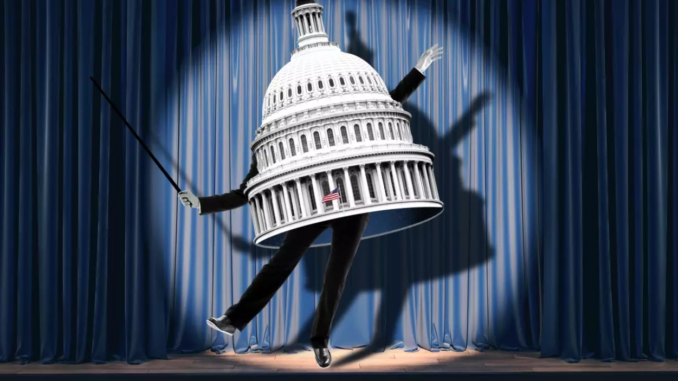
By Nikita Chernin
As the 2024 presidential election looms, theater finds itself at a critical juncture. In an age of deepening ideological divides, the role of political theater is not just timely—it’s essential. Yet calls for “politics-free” theater grow louder by the day, demanding a stage stripped of social critique. This call is not just tone-deaf to theater’s history: it’s an assault on its purpose. Theater has never been neutral. It has always been a force for social critique, a space to confront uncomfortable truths and defy oppressive systems. Those calling for a quieter, “apolitical” stage are not asking for neutrality; they are demanding complacency and the erasure of dissent.
According to theater historians at Santa Clara University, political theater’s origins stretch back to Ancient Greece, where playwrights like Sophocles, Euripides, and Aristophanes tackled political and social tensions head on. These works were not merely entertainment; they were public provocations. “Antigone,” a tragedy by Sophocles, presented a timeless struggle between moral duty and state law, a theme that still resonates as people today grapple with civil disobedience and personal conviction in the face of oppressive systems. Similarly, Aristophanes’ “Lysistrata” critiqued war by depicting women staging a sex strike to force men to negotiate peace, casting a critical eye on politicians and warmongers alike. These early works established a legacy: theater as a vehicle for social resistance and a mirror held up to those in power. Those who argue for politics-free theater are, consciously or not, rejecting theater’s oldest, most defining tradition.
The tradition of resistance and critique in political theater has evolved across centuries, shaped by the social and political challenges of each era. In 19th-century Russia, amid growing class tensions, playwrights like Anton Chekhov and Maxim Gorky spotlighted social inequality and decay. Chekhov’s “The Cherry Orchard” subtly critiqued the complacency of the upper class, while Gorky’s “The Lower Depths” exposed the grim realities faced by the impoverished.
In the early 20th century, Bertolt Brecht transformed theater with his epic theater techniques, introducing the “Verfremdungseffekt” (distancing effect) to encourage critical thinking over passive viewing. His politically charged works, such as “The Threepenny Opera” and “Mother Courage and Her Children,” pushed audiences to confront oppression and injustice head-on, making Brecht’s work a powerful call for societal change.
American political theater found its voice in the 1930s during the Great Depression, notably through the Federal Theatre Project. Productions like “The Cradle Will Rock,” directed by Orson Welles and written by Marc Blitzstein, boldly addressed labor issues and corporate exploitation. This era set the stage for a new wave of theater that could critique power structures, even as The Cradle Will Rock famously defied government censorship with an impromptu audience performance.
Since then, U.S. political theater has continued to confront societal injustices, tackling issues such as racism, homophobia, and class warfare. Plays like Lorraine Hansberry’s “A Raisin in the Sun” and Tony Kushner’s “Angels in America” challenge deep-rooted American values and prejudices. Today, political theater serves as both a mirror and a catalyst for change, testing the freedoms society claims to cherish.
As the 2024 election approaches, we see the essential role of politically engaged theater more clearly than ever. This year, Heidi Schreck’s “What the Constitution Means to Me”—staged in over 16 cities—has resonated across the country, while Selina Fillinger’s “POTUS,” a dark comedy about the American presidency, captures the frustrations many feel toward political leadership. In a time of rampant misinformation and division, plays like these reflect anxieties about democracy itself, offering theater as a platform for discourse and critique.
Yet, this resurgence faces a harsh new reality: an emboldened movement toward censorship. In New York’s Connelly Theater for instance, the Archdiocese of New York–which owns the theater’s space–objected to programming choices on themes like gender identity and reproductive rights. This resulted in the cancellation of performances, according to recent reports from the New York Times. This act of control isn’t just about artistic preference—it’s a blatant attempt to limit public discourse, calling to mind the restrictive censorship movements of the past. It reveals an alarming reality: when those in power fear truth, they will try to silence it.
The Connelly’s experience is only one example. Across the country, theaters are under pressure from landlords, donors, and community gatekeepers to avoid “controversial” topics like systemic racism or climate change. Financial threats often push creators into self-censorship, robbing the stage of its critical role in confronting society’s urgent issues. Censorship in theater is not a relic of the past—it’s an active battle today, with stakes higher than ever.
Theater has always been a battleground for ideas, a rare and sacred space where society can confront itself. Political theater doesn’t exist merely to entertain: it exists to spark action, hold the powerful accountable, and give voice to the silenced. Those who seek to eliminate it are not defenders of art, they are agents of control, shielding themselves from the truths theater exposes.
In a polarized world, political theater is one of the last spaces where people can come together to question, to listen, and to grow. But if we allow censorship to strip theater of its essence, we abandon one of our most powerful tools for progress. We must demand that the stage remains a place for resistance, dialogue, and truth. As political forces seek to silence it, we must protect theater’s power to challenge, confront, and inspire. The future of our culture, and perhaps our democracy, depends on it.
